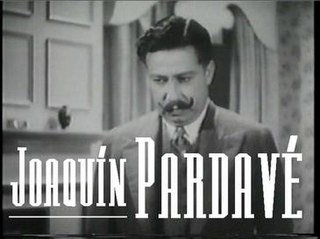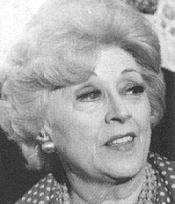Related Research Articles

Ramón Antonio Esteban Gómez Valdés y Castillo was a Mexican actor and comedian. He is best remembered for his portrayal of Don Ramón. He is also recognized as one of Mexico's best comedians.

Mexican cinema dates to the late nineteenth century during the rule of President Porfirio Díaz. Seeing a demonstration of short films in 1896, Díaz immediately saw the importance of documenting his presidency in order to present an ideal image of it. With the outbreak of the Mexican Revolution in 1910, Mexican and foreign makers of silent films seized the opportunity to document its leaders and events. From 1915 onward, Mexican cinema focused on narrative film.

Jorge Alberto Negrete Moreno was a Mexican singer and actor.

Joaquín Pardavé Arce was a Mexican film actor, director, songwriter and screenwriter of the Golden Age of Mexican cinema. He was best known for starring and directing various comedy films during the 1940s. In some of them, Pardavé paired with one of Mexico's most famous actresses, Sara García. The films in which they starred are El baisano Jalil, El barchante Neguib, El ropavejero, and La familia Pérez. These actors had on-screen chemistry together, and are both noted for playing a wide variety of comic characters from Lebanese foreigners to middle-class Mexicans.

Manuel Ojeda was a Mexican actor. Ojeda was one of the most active actors of television and cinema in Mexico. He played the villain, Zolo, in the Hollywood film Romancing the Stone.

Pedro Infante Cruz was a Mexican ranchera music singer and actor, whose career spanned the golden age of Mexican cinema. His popularity spread across Latin America.
Manuel Summers Rivero was a Spanish film director, screenwriter and actor.

Amalia Isabel Rodríguez Carriera, known professionally as Amalia Aguilar, was a Cuban-Mexican dancer, actress and comedian.

Sergio Bustamante was a Mexican actor of telenovelas, cinema, dubbing and theater.

Abel Salazar García was a Mexican actor, producer and director. He appeared in 70 films between 1941 and 1989. He was a son of Don García and his wife, and brother to Don Alfredo Salazar.

Fanny Schiller Hernández was a Mexican award-winning character actress and television star, who also acted in operettas and musicals, during the Golden Age of Mexican cinema. She won two Ariel Awards for best supporting actress, and was nominated for two additional films. She was a social activist, creating the Actor's Union and inspiring the creation of “Rosa Mexicano”. She was accomplished at dubbing and was the voice of many animated characters as well as the official voice of several other notable Mexican actresses.
Nefero was a Mexican painter and founding member of the Salón de la Plástica Mexicana. He was part of the Mexican muralism movement, whose work was particularly influenced by Manuel Rodríguez Lozano.
Events in the year 1986 in Mexico.

Anita Blanch was a Spanish-born, Mexican actress, who worked in the Golden Age of Mexican cinema. She was nominated for an Ariel Award from the Mexican Academy of Film three times and won the Best Supporting Actress Award from Diosa de Plata in 1963.

Elena Sánchez Valenzuela was a Mexican actress, journalist and creator of the Mexican film archive. One of her country’s first silent film stars, she was also a feminist and suffragette.
Events in the year 1960 in Mexico.

Eduardo Arozamena Lira was a Mexican actor. His nickname was "El Nanche Arozamena".
Arturo Ríos is a Mexican actor.
This article lists events occurring in Mexico during the year 2021. The article lists the most important political leaders during the year at both federal and state levels and will include a brief year-end summary of major social and economic issues. Cultural events, including major sporting events, are also listed. For a more expansive list of political events, see 2021 in Mexican politics and government.
This article lists events occurring in Mexico during the year 2022. The article lists the most important political leaders during the year at both federal and state levels and will include a brief year-end summary of major social and economic issues. Cultural events, including major sporting events, are also listed.
References
- ↑ "Filmgramas". El Nuevo Mexicano. 28 Sep 1933. Retrieved 2019-11-12.
- ↑ Literarios, Universidad Nacional Autónoma de México Centro de Estudios (1988). Diccionario de escritores mexicanos, siglo XX: N-Q (in Spanish). UNAM. ISBN 9789703205097.
- ↑ "Manuel Ojeda Prefers Peace in the Silent Drama". The New-York Tribune. 26 Oct 1919. Retrieved 2019-11-12.
- ↑ "Stage and Screen". The Coffeyville Daily Journal. 17 Dec 1919. Retrieved 2019-11-12.
- ↑ "Footlight Flashes". The Philadelphia Inquirer. 20 Jun 1920. Retrieved 2019-11-12.
- ↑ "Select Peru as Location for Studio". The Los Angeles Times. 10 Apr 1921. Retrieved 2019-11-12.
- ↑ Agrasánchez, Rogelio Jr. (2014-01-10). Guillermo Calles: A Biography of the Actor and Mexican Cinema Pioneer. McFarland. ISBN 9780786456482.
- ↑ Gunckel, Colin (2015). Mexico on Main Street: Transnational Film Culture in Los Angeles Before World War II. Rutgers University Press. ISBN 9780813570778.
- ↑ "Manuel R. Ojeda". Secretaría de Cultura/Sistema de Información Cultural (in Spanish). Retrieved 2019-11-12.